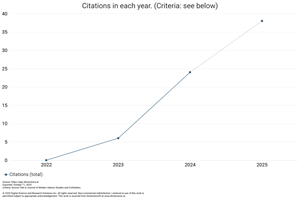The Legal Sanctions of Corruption Criminal Acts in Indonesia from the Perspective of Abdul Majid An-Najjar's Islamic Legal Philosophy
DOI:
https://doi.org/10.59653/jmisc.v3i01.1416Keywords:
Legal Sanctions, Corruption, Islamic Legal Philosophy, Abdul Majid An-NajjarAbstract
This article discusses legal sanctions for criminal acts of corruption in Indonesia from the perspective of Abdul Majid An-Najjar's Islamic legal philosophy. Corruption in Indonesia is a serious problem that harms the economy and social justice. This research employs a descriptive-qualitative approach and falls under the category of normative research that examines documents and literature related to legal sanctions for corruption in Indonesia. This study aims to analyze legal sanctions for corruption in Indonesia based on Abdul Majid An-Najjar's Islamic legal philosophy, which emphasizes the principles of justice, equality, and accountability as a foundation for combating corruption. Abdul Majid An-Najjar proposes sanctions that are not only repressive but also educational and effective in providing deterrent effects, using hudud and ta'zir sanctions as a legal basis that aligns with Islamic moral and ethical values. This research also identifies the relevance and challenges of implementing Islamic legal principles in Indonesia's pluralistic legal system, as well as their impact on preventing and eradicating corruption. This study's findings show that applying Islamic legal principles in Indonesia's legal system can contribute to creating a more just and corruption-free legal system.
Downloads
References
Abdul Majid An-Najjar. (2008). Maqashid Al-Syari’ah Bi Ab’ad Jadidah. Beirut: Dar Al-Gharb Al-Islami.
Abu Fida‘ Abdur Rafi‘. (2004). Terapi Penyakit Korupsi dengan Takziyatun Nafs (Penyucian Jiwa). Jakarta: Penerbit Republika.
Ali, M. N. (2020). Kebijakan Umar ibn Abdul Aziz dalam Pemberantasan Korupsi. Warisan: Journal of History and Cultural Heritage, 1(2), 37-45. https://doi.org/10.34007/warisan.v1i2.305
Al Munawar, F. A. (2021). ‘Abd al-Majīd al-Najjār’s perspective on Maqāṣid al-Sharī’ah. JURIS (Jurnal Ilmiah Syariah), 20(2), 209-223. https://dx.doi.org/10.31958/juris.v20i2.4281
al-Fasi, ‘A. (1993). Maqashid al-Syari’ah al-Islamiyyah wa Makarimuha. Dar al-Gharb al-Islami.
Andi Hamzah. (2007). Pemberantasan Korupsi Melalui Hukum Pidana Nasional dan Internasional. Jakarta: Raja Grafindo Persada.
Barkkry, H. M. K. (1958). Hukum Pidana dalam Islam. Solo: AB Sitti Sjamsijah.
Departemen Pendidikan Nasional. (2008). Kamus Bahasa Indonesia. Jakarta: Pusat Bahasa Departemen Pendidikan Nasional.
Harahap, A. S., & Nelson, F. M. (2023). Tindak Pidana Korupsi di Indonesia, United Kingdom dan Malaysia: Suatu Kajian Perbandingan. Simbur Cahaya, 30(1), 133-155.
Huberman, M. B. M. dan A. M. (1992). An Expanded Sourcebook, Qualitative Analysis Second Edition. Sage Publications.
Husain Syahatah. (2005). Suap dan Korupsi Dalam Perspektif Syariah (translated by Kamra As’ad Irsyad). Jakarta: Amzah.
Mathar, A. (2023). SANKSI DALAM PERATURAN PERUNDANG-UNDANGAN. 'Aainul Haq: Jurnal Hukum Keluarga Islam, 3(II).
Matiman Prodjohamidjojo. (2009). Penerapan Pembuktian Terbalik Dalam Delik Korupsi (UU No. 20 Tahun 2001). Jakarta: Mandar Maju.
Muhammad al-Tahir bin ‘Asyur. (2007). Maqashid al-Shari’ah al-Islamiyyah. Tunisia: Dar Syuun li al-Nashr wa al-Tawzi’.
Muhammad Amin Suma, dkk. (2001). Pidana Islam di Indonesia. Jakarta: Pustaka Firdaus.
Muhammad Shoim. (2009). Laporan Penelitian Individual (Pengaruh Pelayanan Publik Terhadap Tingkat Korupsi pada Lembaga Peradilan di Kota Semarang). Pusat Penelitian IAIN Walisongo Semarang.
Munawar Fuad Noeh. (1997). Islam dan Gerakan Moral Anti Korupsi. Jakarta: Zikhru‘i Hakim.
Nur al-Din bin Mukhtar al-Khadimi. (2008). Abhas fi Maqashid al-Syari’ah. Beirut: Muassasah al-Ma’arif.
Sajali, M. (2023). Sanksi Pidana Korupsi Dalam Hukum Positif (Undang-undang Nomor 31 Tahun 1999 Junto Undang-undang Nomor 20 Tahun 2001) Perspektif Hukum Pidana Islam Dan Hak Asasi Manusia. Siyasah Jurnal Hukum Tatanegara, 3(1), 118-136. https://doi.org/10.32332/siyasah.v3i1.7077
Saragih, Y. M., Armanda, W., & Novaisal, A. (2023). Juridical Study on Abuse of Authority in Corruption Crimes: Analysis of Law No. 19 of 2019 concerning the Corruption Eradication Commission. Journal of Progressive Law and Legal Studies, 1(02), 115–130. https://doi.org/10.59653/jplls.v1i02.92
Sipayung, B., & Wahyudi, A. (2024). Pretrial Determination of Suspects in Corruption Cases: A Critical Analysis of Judge Sarpin Rizaldi’s Decision and Its Implications for Combating Corruption in Indonesia. Journal of Progressive Law and Legal Studies, 2(03 SE-Articles), 225–236. https://doi.org/10.59653/jplls.v2i03.1084
Susetyo, H. (2022). Korupsi Sebagai Kejahatan dalam Hukum Islam. Misykat al-Anwar Jurnal Kajian Islam dan Masyarakat, 5(2), 239-260. https://doi.org/10.24853/ma.5.2.239-260
Sutamaya, A. G., Kurniawan, Y., & Nurhasanah, N. (2022). Hukuman Mati Bagi Koruptor dalam Perspektif Hukum Islam. Jurnal Dialektika Hukum, 4(1), 58-78. https://doi.org/10.36859/jdh.v4i1.858
Syarbaini, A. (2024). TERMINOLOGI KORUPSI MENURUT PERSPEKTIF HUKUM PIDANA ISLAM. Jurnal Tahqiqa: Jurnal Ilmiah Pemikiran Hukum Islam, 18(1), 1-15. https://doi.org/10.61393/tahqiqa.v18i1.205
Wahbah al-Zuhaili. (1986). Ushul al-Fiqh al-Islami. Damaskus: Dar al-Fikr.
Wizarah Al-Awqaf Wa Al-Syuun Al-Diniyah. (n.d.). Al-Mausu’ah Al-Fiqhiyah Al-Kuwaitiyah. Kuwait: Dar Al-Salasil.
Downloads
Published
How to Cite
Issue
Section
License
Copyright (c) 2025 Faishal Agil Al Munawar

This work is licensed under a Creative Commons Attribution-ShareAlike 4.0 International License.
Authors who publish with this journal agree to the following terms:
- Authors retain copyright and grant the journal right of first publication with the work simultaneously licensed under a Creative Commons Attribution-ShareAlike that allows others to share the work with an acknowledgement of the work's authorship and initial publication in this journal.
- Authors are able to enter into separate, additional contractual arrangements for the non-exclusive distribution of the journal's published version of the work (e.g., post it to an institutional repository or publish it in a book), with an acknowledgement of its initial publication in this journal.
- Authors are permitted and encouraged to post their work online (e.g., in institutional repositories or on their website) prior to and during the submission process, as it can lead to productive exchanges, as well as earlier and greater citation of published work (See The Effect of Open Access).
























